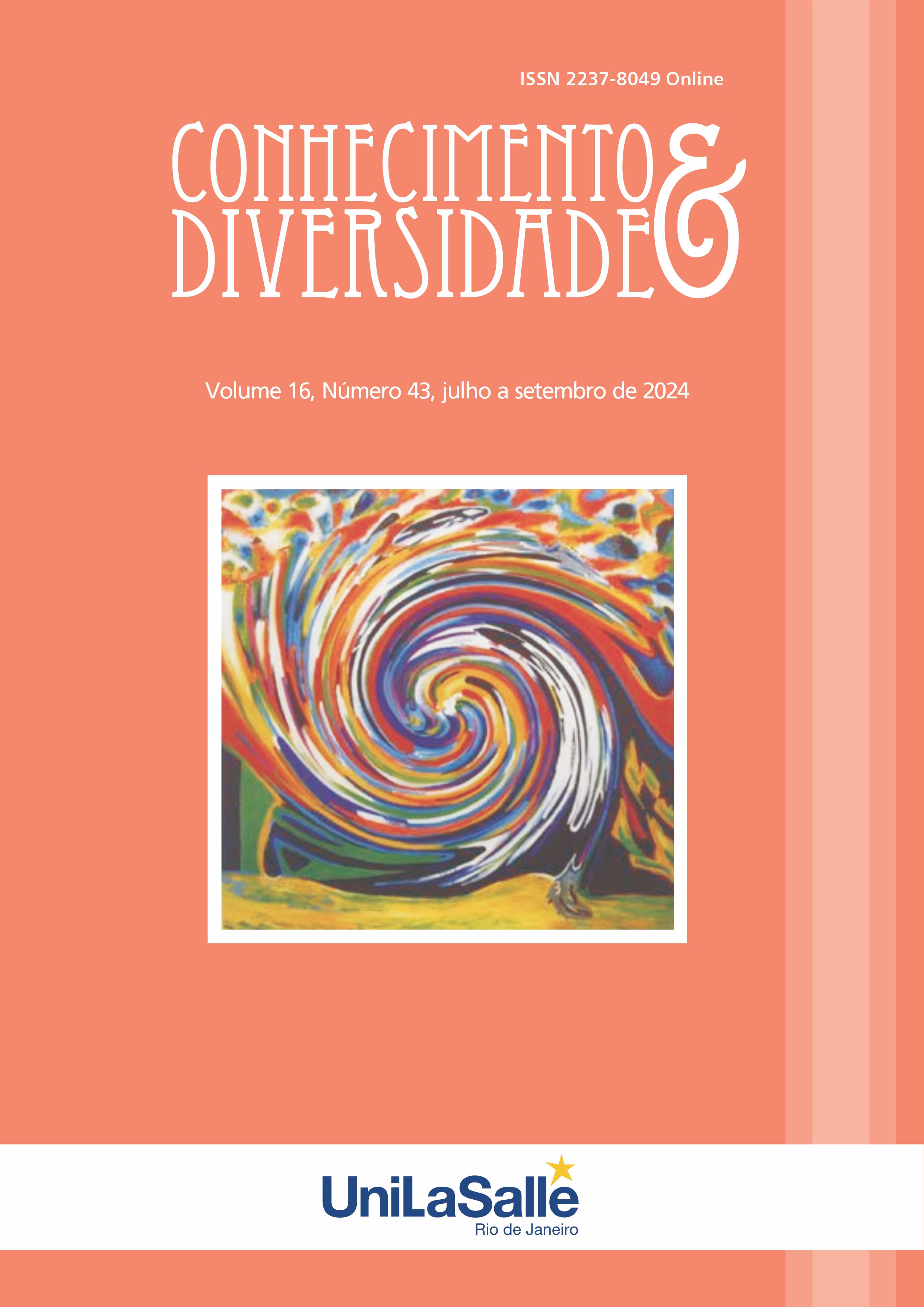A INFLUÊNCIA DA CULTURA DA FALA NA FORMAÇÃO DAS COMPETÊNCIAS LINGUÍSTICAS DOS FUTUROS ESPECIALISTAS
DOI:
https://doi.org/10.18316/rcd.v16i43.11846Palavras-chave:
futuros especialistas, condições pedagógicas, componentes de prontidão, competências linguísticas, cultura da falaResumo
Devido à digitalização do ensino superior, é necessária a modernização da formação especializada em línguas, a fim de produzir profissionais altamente qualificados, capazes de se adaptarem ao mundo digital e alcançarem resultados de aprendizagem óptimos para as gerações futuras. O artigo visa empregar efetivamente o modelo, utilizando componentes de prontidão e condições pedagógicas para a formação de competências linguísticas de futuros especialistas na perspectiva do impacto da cultura da fala. Os seguintes métodos foram utilizados no estudo: análise, síntese, comparação, modelagem, classificação; métodos práticos de investigação (nomeadamente experiência de apuração, formação e controlo; observação; inquéritos). O estudo revelou um aumento significativo no número de entrevistados que demonstraram compreensão do componente conceitual-alvo durante a fase formativa do experimento dentro do grupo experimental, em comparação com o grupo de controle. Após a introdução da metodologia experimental, a componente conteúdo-tecnológica assumiu um valor médio e alto.
Referências
Almerich, G., Orellana, N., Suárez-Rodríguez, J., & Díaz-García, I. (2016). Teachers' information and communication technology competences: A structural approach. Computers and Education, 100, 110-125. https://doi.org/10.1016/j.compedu.2016.05.002
Alvarez, A. Jr. (2020). The phenomenon of learning at a distance through emergency remote teaching amidst the pandemic crisis. Asian Journal of Distance Education, 15(1), 144-153. https://doi.org/10.5281/zenodo.3881529.
Call, K. (2018). Professional teaching standards: A comparative analysis of their history, implementation and efficacy. Australian Journal of Teacher Education, 43(3), 48-93. Retrived from: http://surl.li/rmujm
Elfert, M. (2019). Lifelong learning in Sustainable Development Goal 4: What does it mean for UNESCO’s rights-based approach to adult learning and education. International Review of Education, 65(4), 537-556. https://doi.org/10.1007/s11159-019-09788-z
Haidegger, T., Speidel, S., Stoyanov, D., & Satava, R. M. (2022). Robot-assisted minimally invasive surgery – Surgical robotics in the data age. Proceedings of the IEEE, 110(7), 835-846. https://doi.org/10.1109/JPROC.2022.3180350
Kohut, U. P., Sikora, O. V., & Vdovychyn, T. Y. (2022). Formation of the teacher's individual educational trajectory for the development of digital competence. Information Technologies and Learning Tools, 91(5), 186-204. https://doi.org/10.33407/itlt.v91i5.5006
Kovalchuk, V., Marynchenko, I., Sherudylo, A., Vovk, B., Samus, T., & Soroka, V. (2021). Implementation of the learning model based on the results of future vocational teachers’ professional training. AD ALTA-Journal of Interdisciplinary Research, 11(2), 214-219. Retrieved from: http://www.magnanimitas.cz/ADALTA/110221/papers/A_38.pdf
Kuhail, M. A., ElSayary, A., Farooq, S., & Alghamdi, A. (2022). Exploring immersive learning experiences: A survey. Informatics, 9, 75. https://doi.org/10.3390/informatics9040075
Mccord, C., Bernhard, P., Walsh, M., Rosner, C., & Console, K. (2020). A consolidated model for telepsychology practice. Journal of Clinical Psychology, 76, 1060-1082. https://doi.org/10.1002/jclp.22954
Morze, N., Smyrnova-Trybulska, E., Potes Barbas, M. & Widła, H. Smart Education – evolution in digital world in conditions of internationalisation of higher education – Experts’ Opinions. International Journal of Information and Communication Technologies in Education, 10(1), 13-31. https://doi.org/10.2478/ijicte-2021-0002
Munastiwi, E., & Rahmatullah, B. (2021). The impact of islamic religious education on the development of early childhood religious and moral values during the COVID-19 pandemic in Indonesia and Malaysia. Jurnal Pendidikan Islam, 10(1), 49-66. https://doi.org/10.14421/jpi.2021.101.49-66
Novella-Garcia, C., & Cloquell-Lozano, A. (2021). The ethical dimension of digital competence in teacher training. Education and Information Technologies, 26(3), 3529-3541. https://doi.org/10.1007/s10639-021-10436-z.
Pejić, A., & Piroska, S. M. (2021). Predictive machine learning approach for complex problem solving process data mining. Acta Polytechnica Hungarica, 18(1), 45-63. https://doi.org/10.12700/APH.18.1.2021.1.4
Saad, A., Fatin, N. K., & Bahbibi, R. (2023). The development of a mobile application ismind for formative students’ assessment. Information Technologies and Learning Tools, 98(6), 66-81 https://doi.org/10.33407/itlt.v98i6.5370
Saad, A., Hambira, N., Zin, H. M., Johan, R., & Li, W. S. (2019). Object oriented VS structured analysis and design in system development courses. International Journal of Engineering and Advanced Technology, 8(6S3), 82-88. https://doi.org/10.35940/ijeat.F1014.0986S319
Shahrizal, A. Z. S. A. (2022). A Systematic literature review on the use of podcasts in education among university student. Asean Journal of Teaching and Learning in Higher Education, 14(1), 68-75. https://doi.org/10.17576/ajtlhe.1401.2022.10
Svetsky, S., Mikulowski, D., & Moravcik, O. (2022). Universal IT support design for engineering education. IEEE Global Engineering Education Conference (EDUCON) (p. 498-507). Tunisia. Retrieved from: https://educon-conference.org/
Sweller, J., Merriënboer, van J. J. G., & Paas, F. (2019). Cognitive architecture and instructional design: 20 years later. Educational Psychology Review, 31(2), 261-292. https://doi.org/10.1007/s10648-019-09465-5
Tlili, A., Shehata, B., Adarkwah, M. A., Bozkurt, A., Hickey, D. T., Huang, R., & Agyemang, B. (2023). What if the devil is my guardian angel: ChatGPT as a case study of using chatbots in education. Smart Learning Environments, 10(1), 15-27. https://doi.org/10.1186/s40561-023-00237-x
Turnbull, D., Chug, R., & Luck, J. (2021). Learning management systems: A review of the research methodology literature in Australia and China. International Journal of Research & Method in Education, 44(2), 164-178. https://doi.org/10.1080/1743727X.2020.1737002
Valko, N., & Osadchyi, V. (2020). Education individualization by means of artificial neural networks. The International Conference on Sustainable Futures: Environmental, Technological, Social and Economic Matters (ICSF 2020), 166. 10021. https://doi.org/10.1051/e3sconf/202016610021
Xiang, Y., Yang, Y., & Li, W. (2020). Timely mental health care for the 2019 novel coronavirus outbreak is urgently needed. The Lancet Psychiatry, 7(3), 228-229. https://doi.org/10.1016/S2215-0366(20)30046-8
Zakaria, G. A. N., & Nawi, A. (2020). Design and development of a PBL mobile application in Islamic education: A conceptual framework. International Journal of Information and Education Technology, 10(1), 26-30. https://doi.org/10.18178/ijiet.2020.10.1.1334
Zimmerman, W., Altman, B., Simunich, B., Shattuck, K., & Burch, B. (2020). Evaluating online course quality: A study on implementation of course quality standards. Online Learning, 24(4), 147-163. Retrieved from: https://files.eric.ed.gov/fulltext/EJ1277443.pdf
Downloads
Publicado
Edição
Seção
Licença
Copyright (c) 2024 Olha Dibrova, Nadiia Skrypnyk, Iryna Hotsynets, Liliia Ovcharenko, Halyna Namachynska

Este trabalho está licenciado sob uma licença Creative Commons Attribution 4.0 International License.
Conforme recomendado pelo o Public Knowledge Project, a RCD adota para seus artigos uma licença CREATIVE COMMONS: Atribuição CC BY 4.0.
Esta licença permite que outros distribuam, remixem, adaptem e construam sobre o seu trabalho, mesmo comercialmente, desde que lhe dêem crédito pela criação original.
Esta é a licença mais adequada oferecida.
Recomendado para a máxima divulgação e uso de materiais licenciados.



